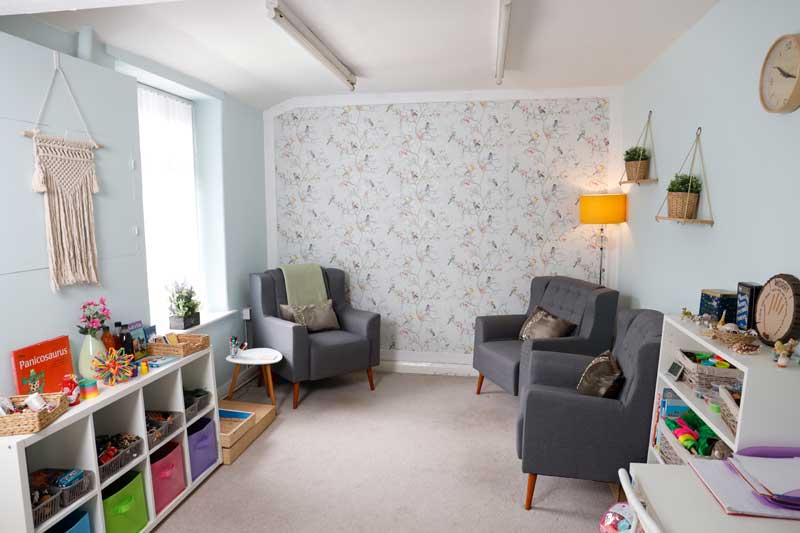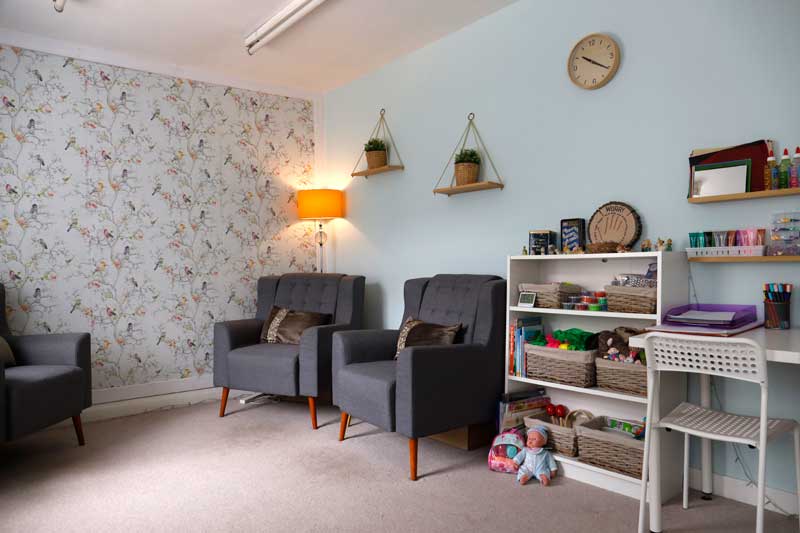Play Therapy
Play Therapy is a developmentally sensitive way of supporting children and young people who are experiencing any social, emotional or behavioural difficulty. It allows them to communicate through their natural medium of expression – play. Through therapeutic play a child is able to identify, work through and resolve emotional conflicts that may be too painful or difficult to express verbally, or are in fact outside of their conscious awareness. The approach encompasses all expressive therapies and utilises therapeutic media such as sand, art, clay, dance and movement, drama, music, and puppets.
Sessions are predominately child led, meaning they have autonomy over the content and pace of their therapy, enabling them to use the time in a way that is most meaningful to them. The therapist will take on an active role in the session, being right alongside your child in the play, interacting as appropriate to facilitate therapeutic content, supporting them to gain insights and understanding into their inner worlds, experiences and emotions.
Key adults in a child’s life may be invited to input into the therapeutic process, such as care givers and school teachers. Regular review meetings will be offered, where information may be discussed as to how a child can continue to be supported by the adults in their life following on from therapy.


Play Therapy FAQs
What is Play Therapy?
Play Therapy utilises a child’s first language of play and metaphor to help explore their inner world.
“Toys are children’s words, and play is their language”
It is a developmentally sensitive approach that enables children to re-enact or play out their life experiences to bring about understanding and change. Sometimes children experience problems with behaviour and feelings that cause a disruption in their lives and limit their ability to fulfil their full potential. Play Therapy helps children to understand confusing and upsetting events and feelings they haven’t yet had the opportunity to face.
How does Play Therapy work?
A Play Therapist is trained in many areas such as child development, trauma and attachment and will communicate with your child through play in a developmentally sensitive manner.
Play Therapy facilitates healing through the creation of a therapeutic relationship to allow your child to be seen, heard and accepted as they are. This type of trusting therapeutic environment is crucial to allow your child to feel safe, comfortable and understood.
What will happen in my child’s Play Therapy sessions?
Your child will have access to a large selection of mediums knows as the Tool Kit. This includes craft materials, sand, dressing up, puppets, creative visualisations and stories. A Play Therapist uses these tools and metaphor to communicate with your child using their natural form of communication and expression in a safe and secure manner to allow your child self-exploration and mastery.
Who can benefit from Play Therapy?
Play Therapy is useful for any child who isn’t currently reaching their full potential socially, emotionally, or academically. This can be down to a range of
Trauma
Loss/Bereavement
Behavioural Difficulties
Bullying
Abuse
Anxiety
Parental Separation
Emotional Difficulties
Intrusive Thoughts
Peer Relationships
What are the proven benefits of Play Therapy?
Giving your child a free space to explore their inner world has been proved to help them:
Develop problem solving skills
Learn to experience and express emotions
Build resilience, confidence and self esteem
Process trauma
Develop respect for others and the self
Cultivate empathy and respect for others
How many sessions will my child need?
Typically, the length of a Play Therapy episode is dependent on the initial assessment conversations and Strength and Difficulties Questionnaire scores. Your chosen Play Therapist will advise you on how many sessions your child will need. However, the number of sessions initially advised is flexible dependant on a review period at 8-10 sessions, here your child’s needs will be discussed and the number of sessions will be revisited to ensure that the episode length is adequate to allow the hope for therapeutic outcomes to be suitably targeted.
A short-term episode is 12 sessions in length, anything more is considered long-term.
Some children respond to short term interventions, however if problems are persistent or have been evident for a long time a longer-term intervention will be required.
Sessions are once a week at the same time on the same day to foster an element of security around the episode. Interruptions and unplanned missed sessions may disrupt the therapeutic process and subsequent progress.
Confidentiality
privacy of their parents or carers. Our aim is to ensure that all those using and working with us can do so with confidence.
Information that you share is treated as confidential. Information shared with other professionals will be done so with your consent and with the best interests of your child and you at the centre of every decision.
Your Play Therapist will remain in contact with you to discuss any changes you witness at home throughout your child’s episode of support. However, the Play Therapist will not disclose specific details of sessions themselves. This is to maintain the trust of your child. You child will know this but will also be aware that should they like to share the contents of their sessions with you as his/her parent or carer than this is their choice.
Sharing information with outside agencies
We will only share information with outside agencies on a need-to-know basis and with consent from parents, except in cases relating to safeguarding children or criminal activity.
We will only share relevant information that is accurate and up to date. Our primary commitment is to the safety and well-being of the children in our care.
Data Protection Act
We comply with the requirements of the Data Protection Act 1998, regarding obtaining, storing and using personal data.
